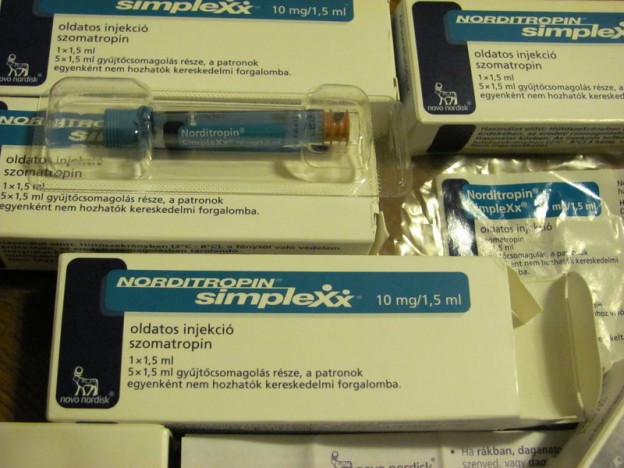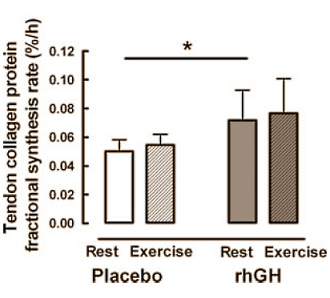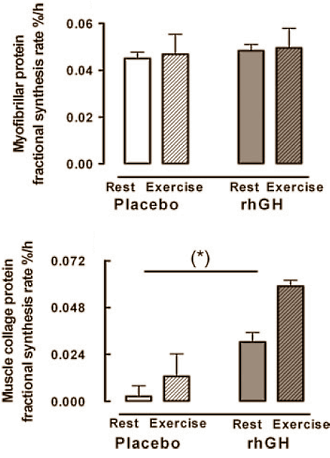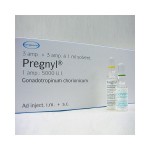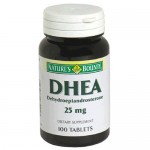By Admin – Steroidal.com
Human Growth Hormone (HGH) is a peptide hormone that stimulates growth, fat loss, cell reproduction and regeneration in humans and other animals. Growth hormone is a 191 or 192-amino acid, single chain polypeptide that is synthesised, stored and secreted by somatotropic cells in the anterior pituitary.
Used medically to treat growth hormone deficiency in the young and elderly, but is becoming more widely available in the United States by anti-ageing clinics and pharmacies. Human growth hormone will increase muscle mass, enhance fat loss, lipolytic effects, nutrient partioning, protein synthesis, bone density, skin thickness and prevent muscle breakdown. Its use has gained popularity since the early 1990’s when competitors became ‘mass monsters’ in a short period of time. Whilst anabolic steroid dosages also probably increased and insulin use became apparent, bodybuilders turned to HGH which added unparalleled levels of muscle mass in combination with other anabolics and growth factors. It has been clinically proven as a peptide that causes cell rejuvenation but what data is there to support is also stimulated healing?
There are a number of clinical studies done on subjects (humans and animals) confirm HGH can be used as cell rejuvenation treatment and for healing certain tissues. It’s a common question; will HGH help me recover from my injury?
In a paper published in the December issue of Hepatology, at the University Of Illinois At Chicago, Professor. Robert Costa and his colleagues report the results of studies on liver regeneration in aged (12 month old) and young (2 month old) mice. This is the standard model system used or studying the molecular mechanisms the body enlists to restore tissue damaged by injury or due to age.
Professor Costa focused on the Foxm1b gene. This is used for the entire life cycle of the mammalian cell – its maturation, proliferation and death. The genes activity declined with age, but is responsible for cell proliferation in the liver, which is also the only human organ that can regenerate with time.
In previous studies conducted, the USA researchers inserted the human Foxm1b gene in aged mice whose livers had been partially removed. The experiments showed that the gene restored levels of Foxm1b proteins and induced the animals’ livers to grow back at a rate typical of younger mice they had tested. More research was conducted which explained it was responsible for making the liver cells divide and multiply. You’re probably asking yourself what this means?
Well, in the present study human growth hormone was given to rats with partially removed livers again and the Foxm1b gene activity was tested. They discovered that Foxm1b levels increased dramatically, as did levels of various enzymes and proteins that cause cells to divide and proliferate. These studies confirm the rejuvenation effects of growth hormone on certain tissues but are there human studies?
The simple answer is, yes. In 2010 Danish researchers published the results of a human trial on 10 healthy men aged 30 a daily injection of human growth hormone for 14 weeks in Denmark. Pure pharmaceutical grade HGH by Norditropin straight out of the Novo Nordisk factory was used. This is not your widely available blue top knock-off from China, a single 36iu pen of Norditropin would fetch $350 on the black market.
In the first week of the study, the Danes gave the subjects 33.3 micrograms of growth hormone per kg of bodyweight, this increased to 50 micrograms in the second week of the clinical trail. The men were told to train their legs doing leg extensions, and 24 hours later, samples were taken from the quadriceps muscles and from the muscle attachments in the knee joint. On another occasion, sampled were taken after no exercise at all.
The figure above shows that collagen, which is the main structural protein and connective tissue found in the body, was elevated after growth hormone administration. Growth hormone was responsible for stimulating the production of collagen but had no effect on the fibres responsible for the muscular contraction.
“In this study, just 14 days of rhGH supplemenation in healthy individuals increased collagen synthesis by up to 6-fold without causing any side effects”, the Danes write. “An increase of this magnitude holds clinical perspectives in relation to traumatic musculoskeletal injuries, where the collagen matrix inevitably is damaged.”
So the Danish researchers speculate that growth hormone could be used as an injury treatment due to helping repair collagen quicker than the control. Similar studies exist demonstrating the same outcome.
Source:
University Of Illinois At Chicago. “Growth Hormone Activates Gene Involved In Healing Damaged Tissue.” 4 December 2003.
J Physiol. 2010 Jan 15;588(Pt 2):341-51.




